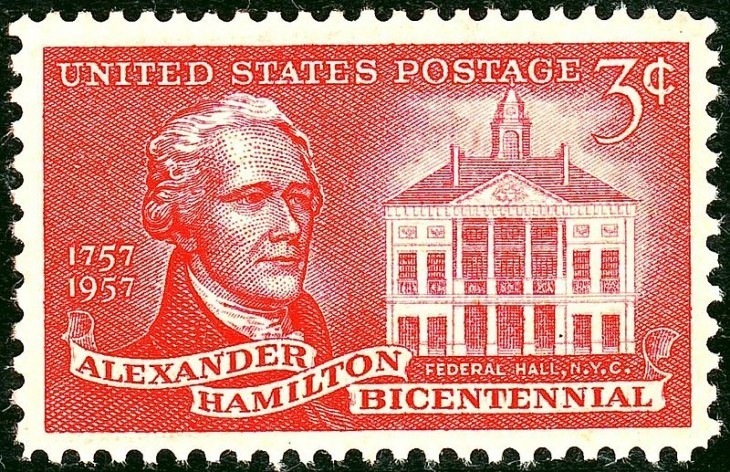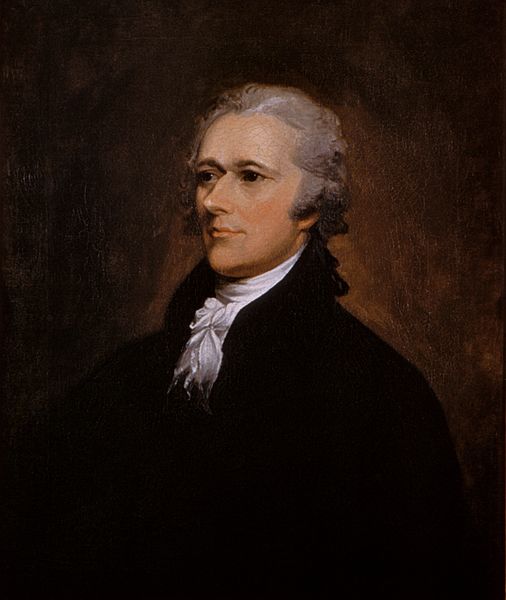[ Editor’s note: This post was first published in 2005, and updated in 2016. ]
We’ve been taking a closer look at the birthdate of Alexander Hamilton, founding father and duelling victim. Some sources say he was born in 1757, but others insist on 1755.

Turns out there’s a controversy over Hamilton’s age that goes back at least five decades. We found it discussed at length in volume one of Broadus Mitchell‘s biography Alexander Hamilton, which was published in 1957; other biographies since then also devote brainpower to the issue.
Hamilton himself named his year of birth as 1757 consistently throughout his life, and it’s the date on his tomb in New York City. (“He died July 12th, 1804, aged 47.”) This is the traditional date, saluted even by the U.S. Postal Service for a 1957 bicentennial (above). However, Hamilton was an illegitimate child, born in the West Indies, and no birth certificate or christening records exist.
The modern controversy comes from probate court records from 1768, the year that Hamilton’s mother died on St. Croix. As part of the probate proceedings, her relative Peter Lytton (Broadus Mitchell calls him “one of the most responsible men on the island”) stated that Alexander and his brother James were 13 and 15, respectively. Thus, counting backwards, one can conclude that the boys were born in 1755 (Alexander) and 1753 (James).
Mitchell finds this convincing (and he was deep into Hamilton, publishing a half-dozen books on his life and influence). But not all scholars agree. Presumably Lytton had no reason to lie about it, and presumably he was in a position to know the boys’ ages… but on the other hand, the circumstances of the boys’ birth were pretty convoluted: their mother had walked out on her neer-do-well husband in 1750 but he didn’t file for divorce until the end of the decade, by which time she’d had two boys by another neer-do-well, Hamilton’s father (who later walked out on them). Between the mate-swapping, the confusion and the taint of illegitimacy, it’s possible that Lytton didn’t have the right figures or had some personal reason to fudge them.
Lytton then proceeded to commit suicide the next year. It was a complicated childhood for poor Hamilton.

Everyone seems to agree that Alexander Hamilton got a charge out of presenting himself as a genius prodigy, and those who lean toward 1755 count that as one more reason to doubt him on 1757. (Film director Steven Spielberg pulled the same trick 190 years later.)
Alexander Hamilton, the 2004 biography by Ron Chernow that was the basis for Lin-Manuel Miranda‘s hit Broadway musical Hamilton, spends surprisingly little time on the issue. Chernow notes that more recent evidence points to 1755 and suggests that Hamilton “may have decided to ‘correct’ his age and shed a couple years” when he applied to Princeton. (If born in 1755 he would have been 18 years old — rather old for admittance to college in those days.)
Chernow acknowledges the “preponderance” of evidence for 1757 once Hamilton arrived in New York, but decides that “preferring the integrity of contemporary over retrospective evidence, we will opt here for a birthday of January 11, 1755.”
Far be it from us to buck Mr. Chernow and his expertise. However, at this point, barring new data, we are sticking with 1757. The actual date of Hamilton’s birth is unknowable, and our view is that long-established dates shouldn’t be altered without rock-solid proof to the contrary. Though we find the probate records and the statement of Peter Lytton to be intriguing, and Chernow’s opinion to be important, Who2 is sticking with 1757 as Hamilton’s year of birth.
Besides the Broadus Mitchell biography, you can get more information on the topic from Odd Destiny: The Life of Alexander Hamilton (1982, Macmillan, by Marie Hecht) and Alexander Hamilton: A Life (2003, HarperCollins, by Willard Sterne Randall). Hecht leans toward 1757 and Randall comes out flatly for 1755. Randall has great detail on the death of Hamilton’s mother and the arrival of the probate officers. Curiously, he also apes Mitchell’s description of Peter Lytton word for word: “One of the most responsible men on the island.”
See our full profile of Alexander Hamilton »
